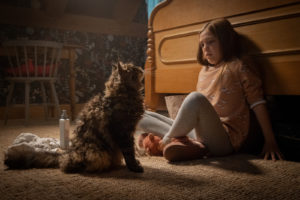‘Pet Sematary’: The Best Thing About Your Movie Shouldn’t Be A Zombie Cat

At this point in horror-movie history — hell, in American history — trace elements of Stephen King linger in every breath. In 2019, the setup to one of his film adaptations feels as familiar in our cinematic language as a vanload of horny teens headed to a remote cabin, or a group of misfit baseball players making fools of themselves in the game before the new coach arrives, or a hero’s father dying to catalyze an epic journey.
These tropes are as comforting as they are exhausting, and one of the more curious things about this spring’s re-adaptation of the 1983 novel Pet Sematary is how little effort is made to push the Stephen King brand beyond its essentials. From the moment the new movie’s camera creeps over a New England treeline and eventually onto the blood-stained porch of a secluded home, it just couldn’t be any more Stephen King. And lesser, downbeat King at that. In a world where Andy Muschietti’s It is translating the author’s monolith into a legitimately terrifying box-office heavyweight and Stranger Things is capitalizing on the adolescent wonder of the King ethos for all its worth, Pet Sematary is a strange undersell. In more ways than one, it’s a flawed family film.
The family in question, the Creeds, have had enough of hectic Boston life. You know, because of cities and how they are so hectic. And you also must know how the utter isolation of rural Maine is a cureall for inescapable trauma. The mother, Rachel (Amy Seimetz), is haunted by the childhood death of her sister. The father, Louis (Jason Clarke), is haunted by Boston and how there were car horns and he had a well-paying job as a doctor there. The children, Gauge and Ellie, don’t seem too haunted, but there’s a “Pet Sematary” (spelled wrong on its sign by the local children) on the family’s new property that ought to do the trick.
I’ll say this for Pet Sematary: the movie’s lack of ambition in reinterpreting King or challenging any of our preconceived notions about what his movies do result in some ass-backward charms. An ordinate amount of visual attention is paid to the family cat, Church, who dies and is resurrected as a matted little hisser. No one likes it less than me when pet owners explain how cats are independent creatures (different than dogs; did you know???), but the God-spiting independence of this particular creature, as it glares at its increasingly uneasy family, is good for a series of pretty broad laughs.
Then, the acting is occasionally interesting, even it doesn’t add up to much. John Lithgow, for one, is given a lot of screentime as the Creeds’ scruffy, lonesome neighbor Judd. Looking indistinguishable from Nick Nolte on a Tuesday, Lithgow goes more woodsman nervous than mountain-man soulful with the performance. And Jason Clarke, as you’d expect, is a B-level brooder who does a pretty fine job mixing the disheveled with the dutiful as the plot grows crazier and he believes himself to be faced with moral conundrums that don’t really seem like conundrums. No spoilers here, but you saw what happened to the cat, right, Jason Clarke? The first hour of the movie is just how not chill that cat is post-resurrection.
But these are just incidental chuckles or shivers, and they fade quickly if you try to make sense of the movie for its themes, writing, mythology, anything else at all. Pet Sematary is curiously overstuffed for how simple a story it is. Why does every member of the Creed family require their own little minds-eye nightmare when they’re all experiencing the same tragedy in real time? The fact that Rachel’s dead sister is portrayed as legitimately evil for some reason and suffered a hyperbolic form of scoliosis fills time, yes, gives the special effects team something to do in flashbacks, yes, but just isn’t very important to this story or to Rachel as a human woman. The fact that Judd’s wife died of an undisclosed illness means little. The fact that Louis loses a patient to a fatal car accident on one of his first days at the small-town hospital is just a thing that happens. We need another word for “McGuffin,” but for plot details that don’t necessarily distract; they just kind of lie there. The movie contains about the same amount of genuine tension and meaning as “The Monkey’s Paw,” but that’s a 10-page short story, not a 100-minute film.
Also, call me a traditionalist, but a movie should not be called Pet Sematary if the pet cemetery is not a key component. I’d have given it a “bad-good” walking out of the theater, and it got bad-worse with every word I wrote.
All Episodes
our favorite movies
all movies
Wait, What is This?
Movie Reviews & Reappraisals
Be Reel was a movie reviewing & reappraising podcast hosted by Chance Solem-Pfeifer and Noah Ballard.
We cherished our 8-year run, talking to filmmakers like Gus Van Sant, insulting each other’s taste, and laughing to high heaven.
Chance’s new movie podcast, The Kick, continues to explore curated sub-genres and movie geekery. Noah is a frequent and beloved guest.